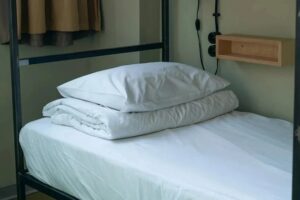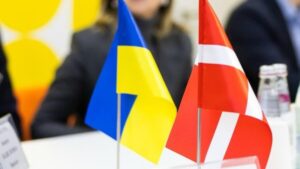
Telecommunications operator Datagroup PJSC, which has been part of the DVL group of companies (Datagroup-Volia-lifecell) since September 2024, earned a net profit of UAH 94.04 million in January-September 2025, compared to a net loss of UAH 129.79 million in the same period last year.
According to the report in the NSSMC disclosure system, the company increased its revenue by 17.5% to UAH 1 billion 413.30 million in the first nine months of this year, while gross profit decreased by 6.5% to UAH 381.89 million, and operating profit decreased by 7.2% to UAH 107.45 million.
The company’s report notes that the most important priority remains maintaining stable network operation, its modernization, and further development of services.
“The company continued its initiatives towards systematic investment in improving the reliability of its networks, ensuring their energy efficiency, power backup, and the introduction of GPON technology in Ukrainian cities. The company also optimized the frequency resource used, which significantly increased the average speed of mobile Internet,” Datagroup added.
As reported, the company’s net profit for January-June 2025 was UAH 78.58 million, compared to a net loss of UAH 43.05 million for the same period last year. Revenue increased by 14% to UAH 917.40 million, while gross profit decreased by 3.2% to UAH 267.72 million, and operating profit decreased by 37.7% to UAH 75.34 million.
In September 2024, NJJ Holding, led by French investor Xavier Niel, completed the acquisition of national fixed-line internet service provider Datagroup-Volia and third-largest mobile operator lifecell. The assets were merged into the DVL group.

Renault Ukraine, the official importer of Renault cars in Ukraine and a wholly owned subsidiary of France’s Renault, earned a net profit of nearly UAH 225 million in January-September this year, which is three times more than last year.
According to the company’s published financial statements, its net sales revenue decreased by 17.3% to UAH 5 billion 572.6 million.
The company increased its gross profit by 2.3 times to UAH 528.8 million, receiving UAH 231.6 million in operating profit (3.8 times more).
The company’s financial statements also contain financial results for the third quarter of this year, according to which net profit increased by 93.3% compared to July-September 2024, to UAH 71.9 million, while net revenue decreased by 33.8%, to UAH 1 billion 828 million.
Renault Ukraine notes in its report that after a significant drop in sales due to the full-scale war, the market for new cars in Ukraine is gradually recovering, especially in the central and western regions of Ukraine, while in the eastern and southern regions it remains low due to the security situation.
In addition, interest in electric vehicles is growing due to “the absence of excise taxes and import duties, economy of use, and environmental trends,” but the charging station infrastructure is still underdeveloped, especially outside major cities.
“Many sales are accounted for by corporate fleets (company transport, logistics, taxis, car sharing), rather than private individuals,” the company states, characterizing the market.
Renault Ukraine also notes that due to inflation, currency fluctuations, and logistics costs, prices for new cars have risen significantly, reducing the share of buyers who can afford a new car without financing.
“Demand for new cars is still quite limited, and a significant share of the market belongs to used cars. This creates competitive pressure on the new vehicle segment,” the document says.
The importer Renault Ukraine was founded in 2005 as a subsidiary of the French company Renault SAS, which is part of the Renault Group.
As reported, in 2024, Renault ranked second in the sales of new passenger cars in Ukraine after Toyota, increasing sales in the dealer network by 22.6% to 7,145 units and its market share by 1.06 percentage points to 10.02%.
According to the Ukravtoprom association, in October of this year, sales of new Renault passenger cars fell by 37% compared to October 2024, to 494 units, and the brand ranked fifth in the monthly rating.
As reported, French carmaker Renault SA increased its revenue by 6.8% year-on-year to EUR11.43 billion in the third quarter.
The Renault Ukraine report notes that as part of its international strategic plan until 2027, Renault plans to release eight new models outside Europe, including five in segments C and D. The new Duster and Renault Kardian have already been presented in Ukraine.

The Irish government has agreed to reduce the length of stay for newly arrived Ukrainians in state housing from 90 to 30 days, according to national broadcaster RTE.
“Previously, people who fled the war in Ukraine could stay in such housing for up to 90 days. According to the government, if the current trend continues – with about 50 people a day needing 90-day accommodation – all available places could be exhausted as early as this month,” the report said.
In addition, the subcommittee agreed to introduce weekly financial contributions for accommodation in state housing for working asylum seekers. According to Justice Minister Jim O’Callaghan, the mechanism will be developed jointly with Minister of State Colm Brophy and presented to the governing parties in the coming weeks before being submitted to the Cabinet for final approval.
The minister said the fee for residents of IPAS (Interdepartmental Provision of Asylum Services) centers could range from €15 to €238 per week, depending on income.
“Ultimately, it will be a government decision, but we are recommending these proposals and believe they are appropriate,” he said.
O’Callaghan also acknowledged that the number of Ukrainians arriving in Ireland has increased significantly since September, noting that more than 100,000 Ukrainians have arrived since 2022, with about 80,000 currently in the country.

In January-September of this year, PJSC Zaporizhstal reduced its net profit by 3.1% compared to the same period last year, to UAH 1 billion 547.508 million from UAH 1 billion 597.318 million.
According to the company’s interim report in the NSSMC’s information disclosure system, its net income for this period increased by 0.9% to UAH 53.583 billion from UAH 53.131 billion.
Retained earnings at the end of September 2025 amounted to UAH 32.558 billion.
According to the annual report, Zaporizhstal received a net profit of UAH 1 billion 593.521 million in 2024, compared to a net loss of UAH 3 billion 899.537 million a year earlier. At the same time, revenue in 2024 amounted to UAH 70 billion 307.933 million, compared to UAH 56 billion 428.254 million in 2023.
The total number of employees of the group at the beginning of 2025 was 9,328 thousand. In 2024, the wage fund amounted to UAH 2 billion 742.616 million.
In 2025, the company plans to develop three types of new products: hot-rolled coils and cut sheets of S355JRC steel (suitable for cold forming); hot-rolled coils and cut sheets of S355 steel measuring 2.5-2.7×1000-1250 mm, and cold-rolled coils of S280GD steel for galvanizing.
As reported, Zaporizhstal ended 2022 with a net loss of UAH 4 billion 864 million 684.828 thousand, while in 2021 it received a net profit of UAH 16 billion 809 million 158.412 thousand.
Zaporizhstal is one of Ukraine’s largest industrial enterprises, whose products are widely known and in demand on the domestic market and in many countries around the world.
According to the company’s data at the end of 2024, Kyiv Security Group LLC owns 24.5% of Zaporizhstal’s shares, Midland Capital Management LLC (both based in Kyiv and registered at the same address) owns 11.22%, Global Steel Investments Limited (United Kingdom) – 12.35%, Metinvest B.V. (Netherlands) – 47.003174%.
According to the NDU data for the second quarter of 2025, Kyiv Security Group LLC owns 24.5% of Zaporizhstal shares, Midland Capital Management LLC (both based in Kyiv and registered at the same address) owns 11.22%, Global Steel Investments Limited (United Kingdom) – 12.34%, Metinvest B.V. (Netherlands) – 47%.
Earlier it was reported that Metinvest Group’s effective shareholding in Zaporizhstal remains at 49.9%.
Zaporizhstal is in the process of integration into the Metinvest Group, whose main shareholders are System Capital Management (71.24%) and the Smart Holding group of companies (23.76%).
Metinvest Holding LLC is the managing company of the Metinvest Group.

According to the results of 2024, PJSC Firm Fundament (Kyiv) received a net loss of UAH 19.2 million, compared to a net profit of UAH 86,000 in 2023.
According to the company’s report in the information disclosure system of the National Securities and Stock Market Commission of Ukraine (NSSMC), its net income grew by 50.8% compared to the previous year and reached UAH 69.6 million. The company’s gross profit grew by 52.6% and amounted to UAH 8.2 million.
The company’s retained earnings during 2024 decreased by 30.8% to UAH 44.2 million. Current liabilities decreased by 12.5% compared to 2023 – UAH 50.1 million, and long-term liabilities by 36% – to UAH 3.6 million.
The total assets of PJSC “Firma ”Fundament” decreased by 22.2% in 2024, to UAH 102.7 million.
As noted in the company’s annual report, in 2024, the production of concrete products for defense purposes was organized on the territory of the production and technical base. The main types of income for the company are also income from the installation of pile foundations, general construction works, and engineering services (general contracting services).
The main consumers of the company’s services are developers in Kyiv: DBK Fundament Stolitsa Group LLC, Poznyakizhylbud, and Saga Development. The main consumers of concrete products are defense industry structures.
According to the report, in 2024, the number of employees decreased from 163 to 145. The company cites the shutdown of construction projects and mobilization into the ranks of the Defense Forces as one of the main reasons for the staff turnover. Since 2021, the number of employees has halved.
According to the National Securities and Stock Market Commission, as of the first quarter of 2025, the shareholders of PrJSC “Firma ”Fundament” are Oleksandr Yarosh (46.8%) and Dmytro Alekseev (45.8%).
PJSC “Firma ‘Fundament’ is part of the ”Fundament” construction group.

Denmark is investing 10 million Danish kroner (EUR1.34 million) in Ukrainian culture and the restoration of Ukrainian cultural heritage, said Ukraine’s Deputy Prime Minister for Humanitarian Policy and Minister of Culture Tetiana Berezhna on Monday after meeting with Denmark’s Minister of Culture, Media, and Sport Jakob Engel-Schmidt.
“Denmark is investing 10 million Danish kroner in Ukrainian culture and the restoration of Ukrainian cultural heritage. This was announced today by Danish Minister of Culture, Media and Sport Jakob Engel-Schmidt during our joint press conference. Mr. Engel-Schmidt also noted that their goal is to encourage other countries to follow Denmark’s example. Thank you for your leadership in supporting Ukraine!” Berezhna wrote on her Facebook page.
The minister noted that the Ukrainian delegation joined an informal meeting of European Union ministers of culture and media in Copenhagen.
“We are presenting to our colleagues the mechanics and key objectives of the Ukrainian Cultural Heritage Fund, a platform for restoring cultural heritage and strengthening culture. We are showing the figures of the destruction caused by the Russian Federation. We are talking about the top priorities for restoration for the next three years. We will also hold a series of bilateral meetings in Copenhagen with European partners, Danish cultural institutions, and the Ukrainian community,” Berezhna said.
She thanked Denmark for supporting Ukraine’s participation in the event, for its partnership and investment in Ukrainian culture and restoration.